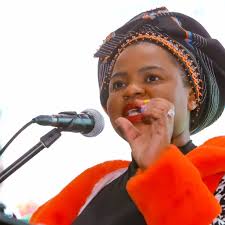
As the country observes the 16 Days of Activism for No Violence against Women and Children campaign, the Director of the Department of Social Development, Dr Bongi Owusu, has called for unity and action in dealing with this scourge.
South Africa faces a dire gender-based violence and femicide (GBVF) crisis, with alarming statistics highlighting the urgent need for collective action to address this “second pandemic.”
Owusu, the Director of Gender and Women Empowerment at the department, said when President Cyril Ramaphosa described GBV as South Africa’s “second pandemic" at the time of the COVID-19 outbreak, he emphasised the severity of this national crisis.
“He called on everyone to unite in eradicating the scourge of GBV, a plague that transcends gender, sexual orientation and social status, demanding a concerted response from all sectors of society,” Owusu said.
She highlighted the importance of reflecting on what solidarity truly means in this struggle.
“True solidarity involves everyone -- men, women, children and marginalised communities, standing together against GBV,” she asserted.
Owusu further stressed the need to dismantle harmful gender stereotypes that perpetuate violence and marginalisation. In many communities, she said, women are still treated as minors, with their voices dismissed solely because of their gender.
While women remain the primary victims of GBV, Owusu advocated for an inclusive approach to tackling GBVF. In the same breath, she underscored the importance of recognising that violence is not confined to one gender.
“We must acknowledge that there are women who perpetrate violence and men who are survivors. Comprehensive interventions must reflect this reality, recognising the diverse forms and experiences of GBV,” she said.
A critical step in combating GBV lies in dismantling toxic masculinity. Owusu noted that society often reinforces harmful ideals by discouraging men from expressing vulnerability.
“When boys are told, ‘men don’t cry’, it fosters emotional repression and disconnection, which can manifest in harmful behaviours. Women - whether as mothers, sisters or partners - can help by affirming that it is okay for men to express their emotions. This simple shift can break cycles of violence and foster healthier, more empathetic relationships,” she emphasised.
South Africa’s GBV statistics remain deeply troubling. According to the South African Police Service (SAPS), over 120 women were raped daily between April and June 2023, and a woman is murdered every three hours in the country. These figures are grim reminders that the majority of GBV victims are still women and children.
Owusu highlighted the importance of engaging men as allies in the fight against GBV.
“It is crucial to involve men as positive partners in this battle. This approach not only challenges the narrative that all men are perpetrators but also encourages men to take a stand and say, ‘Not in my name’. Engaging men as active participants can inspire a new generation of boys to value respect, empathy and non-violence,” she said.
Owusu emphasised the role of the community and its leaders, including religious and traditional figures, as gatekeepers of societal norms. However, she lamented that some perpetuate harmful ideologies.
“Faith-based organisations must challenge practices that victimise women and condone abuse. Traditional leaders and their spouses... have a unique role in shaping young minds. For example, boys can learn respectful masculinity, while girls are guided towards self-empowerment,” Owusu explained.
The fight against GBV demands courage, collaboration and a commitment to challenging harmful norms. It calls for a society that rejects stereotypes, promotes inclusivity, and holds perpetrators accountable.
Owusu’s plea is straightforward: a collective commitment to eradicating GBV must begin in homes, workplaces and communities.
“Ending GBV is not the responsibility of a few but the duty of all. By fostering partnerships across gender, faith, and cultural lines, South Africa can become a beacon of hope -- a society where no one suffers in silence, and everyone is empowered to thrive,” Owusu said as the 16 Days of Activism campaign continues. – SAnews.gov.za


